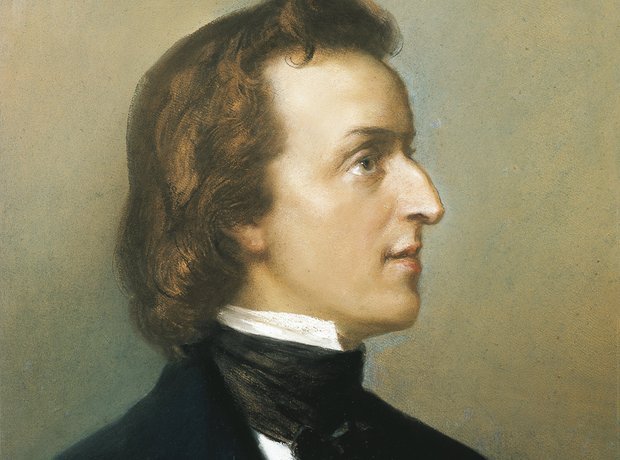Chopin’s Story
Listen While You Read
Please listen to Chopin’s Nocturne in B Flat Minor, Op. 9, No. 1 while reading this short summary of his life which will help to provide an understanding of his work.
The Greatest Composer of The Romantic Era
Fryderyk Chopin was a Polish composer and pianist born on March 1, 1810, in Żelazowa Wola, near Warsaw, Poland. He is considered one of the world’s greatest composers.
His music is renowned for its lyrical beauty, technical virtuosity, and musical expressiveness. It reflects his Polish heritage as well as his personal experiences and emotions.
His compositions, such as the one that you are listening to, changed music forever. They were said to come “from his soul” and were full of refinements of harmony that had never been heard before; bold and of startling originality.
Below is a quote from Franz Liszt, a fellow composer and piano virtuoso of the Romantic era, about Chopin’s works.
“It is the feeling that overflows in all his works, which has rendered them known and popular; feeling of a character eminently romantic, subjective individual,peculiar to their author, yet awakening immediate sympathy; appealing not only to the heart of that country indebted to him for yet one glory more, but to all who can be touched by the misfortunes of exile or moved by the tenderness of love.”
A Child Prodigy
Chopin began to play the piano at a young age and quickly showed remarkable talent. He received piano lessons from his mother and later from the renowned pianist and composer Wojciech Żywny.
At the Warsaw Conservatory, he studied with Josef Elsner, another well-known Polish composer, who taught him music theory and composition
Young Chopin
"Chopin, Fryderyk, third-year student, amazing capabilities, musical genius." -Josef Elsner
In his early twenties, Chopin travelled to Vienna in 1829 where he began to gain a reputation as a piano virtuoso.
While he was away, the 1830 November Uprising took place in Poland, so he was barred from returning to his homeland.
He obtained permission to travel to Paris and arrived in 1831, where he quickly established himself as a leading pianist and composer.
Frail, Preferred Salon Performances
Chopin's health was fragile and he suffered from a chronic respiratory illness throughout his life. Despite his poor health, he continued to compose and perform, and his works were highly regarded by audiences and fellow musicians alike.
Unlike, Franz Liszt, who was a showman and enjoyed playing the piano before large crowds in concert halls, Chopin preferred to perform in the smaller settings of Paris salons. This way he could invite only those people that he knew would appreciate his music.
In addition, his new form of Romantic music often required a lighter touch and did not resonate as well in large venues. Below he is pictured playing at the famous Hotel Lambert where his Polish countrymen often gathered.
Gathering of Polish aristocrats exiled in Paris at Hotel Lambert circa 1831
At The Center of Intellectual Circles
He was also known for his close personal relationships with many of the leading literary and musical figures of his time, including the musician Franz Liszt, the artist Eugene Delacroix, the composer Hector Berlioz as well as the writers Victor Hugo and Aurore Dupin Dudevant, better known as George Sand.
George Sand
In the early 1800’s, women writers did not have the level of recognition or respect enjoyed by their male counterparts. For this reason Madame Dudevant wrote under the pseudonym of George Sand; she also dressed like a man and smoked cigars.
An Unlikely, But Devoted Relationship
Chopin and Sand were a famous literary and musical couple of the Romantic era. Their relationship seemed an unlikely one. She was a journalist and intellectual, widely known for her unconventional lifestyle and strong opinions. He, on the other hand, was a delicate and private person, and their relationship was seen as unusual at the time because Sand was married and had children, while Chopin was single.
Despite their differences, their relationship was a devoted and creative one, and it had a significant impact on both of their lives and works. George Sand was a great supporter of Chopin's music and encouraged him in his composing.
Their relationship was also marked by difficulties, such as Chopin's poor health and their disagreements over artistic and political matters. Yet they remained together for eight years. And even today their relationship continues to be the subject of much interest and speculation.
Lost Too Soon
Chopin died of tuberculosis on October 17, 1849, in Paris at the age of 39. He is buried in the Père Lachaise Cemetery in Paris. However, he requested that his sister Ludwicka take his heart back to Warsaw, Poland where it is enshrined in the Holy Cross Cathedral.
Chopin’s heart Is enshrined in the crypt (left) in Holy Cross Church, Warsaw
Despite his relatively short life, his music has had a lasting impact and continues to be widely performed and recorded.




